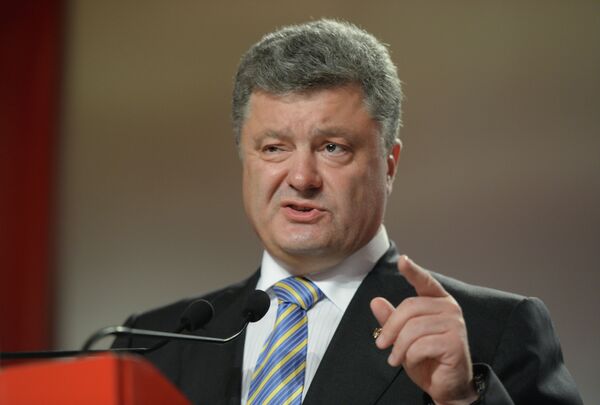MOSCOW, May 26 (RIA Novosti), Daria Chernyshova – The future of dialogue between Moscow and Kiev depends on likely incoming Ukrainian President Petro Poroshenko's policy towards the country’s eastern regions, Nicolai Petro, a professor of international politics at the University of Rhode Island told RIA Novosti Monday.
“Very much will depend on whether or not Petro Poroshenko can establish effective control over the power ministries in Kiev. The answer will become apparent in the strategy that he pursues toward Donbas,” Nicolai Petro said while commenting on future relations with Russia.
With over 60 percent of ballots counted, tycoon Poroshenko has taken 53.7 percent of the votes in the presidential race in Ukraine, with the country’s former Prime Minister Yulia Tymoshenko coming in second with 13.1 percent.
“I gather that, for Russia, the top issue is ending military actions in eastern Ukraine and establishing a dialogue between Kiev and Donbas,” Nicolai Petro told RIA Novosti.
“If president Poroshenko were to place a moratorium on the military campaign in the east, gain effective control over the private militias, and initiate negotiations with the rebels, I assume that this would strongly predispose Russia to a more positive view of the regime in Kiev, and have a beneficial impact on negotiations over many other outstanding issues, including the gas debt,” he added.
Petro also recalled Russian President Vladimir Putin remarks last week that Moscow will find a way to work with any Ukrainian government, “even one that it finds totally unpalatable.”
“There are certainly many issues in Russian-Ukrainian relations that need to be resolved, but a certain minimum level of trust must be established in order for any negotiations to bear fruit,” he said.
Petro also stressed that Poroshenko will have to assert control over “the privately funded militias that are now operating ‘in support’ of the Ukrainian military” in order to assert control over military policy. “These vigilante groups are only fueling resistance in Donbas by exacerbating the already widespread ‘fear of the radicals in Kiev,’” Petro added.
But while one option for the president is to pursue a cease fire and negotiations, Petro said “another would be to pursue full military victory in the east against the ‘terrorists,’ followed by some form of de facto occupation.”
“This latter course is being advocated by some in the ‘power ministries’ in Kiev, as well as by the oligarchs who are funding the private militias now operating there. President Poroshenko’s first political battle will therefore have to be with those in the current interim government who prefer a military resolution to the conflict in the East,” Petro told RIA Novosti.
On Sunday, Ukraine held an early presidential election that was scheduled after a regime change in February. The election came amid a deep political crisis and a large-scale military operation launched by the new Kiev authorities to crack down on protesters refusing to recognize the legitimacy of the government.
The eastern regions of Donetsk and Luhansk that held self-determination referendums earlier this month said they would not take part in the election, and polling stations were open only in some 9 out of 34 election districts of the Donetsk Basin region, known as the Donbas.
“The very low turnout in the Donbas should be attributed to a combination of factors, including the inability to open polling places, lack of local interest in the available candidates (‘no one who represents the interests of our region’), and a not insignificant group who no longer wish to be part of Ukraine. I would guess that each of these accounts for an equal percentage of abstentions,” Petro said.




